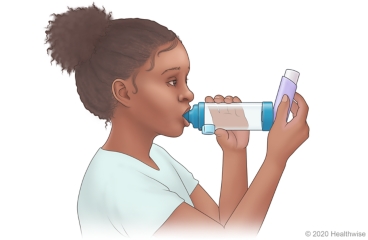Overview

Asthma makes it hard for your child to breathe. During an asthma attack, the airways swell and narrow. Severe asthma attacks can be life-threatening, but you can usually prevent them. Controlling asthma and treating symptoms before they get bad can help your child avoid bad attacks. You may also avoid future trips to the doctor.
Follow-up care is a key part of your child's treatment and safety. Be sure to make and go to all appointments, and call your doctor if your child is having problems. It's also a good idea to know your child's test results and keep a list of the medicines your child takes.
How can you care for your child at home?
Action plan
- Make and follow an asthma action plan. It lists the medicines your child takes every day and will show you what to do if your child has an attack.
- Work with a doctor to make a plan if your child does not have one. It's important that your child take part as much as possible in writing the plan.
- Tell adults at school or any child care center that your child has asthma. Give them a copy of the action plan. They can help during an attack.
Medicines
- Your child may take an inhaled corticosteroid every day. It keeps the airways from swelling.
- Your child will take quick-relief medicine for an asthma attack. This is usually inhaled albuterol. It relaxes the airways to help your child breathe.
- If your doctor prescribed oral corticosteroids for your child to use during an attack, give them to your child as directed. They may take hours to work, but they may shorten the attack and help your child breathe better.
Check your child's breathing
- Check your child for asthma symptoms to know which step to follow in your child's action plan. Watch for things like being short of breath, having chest tightness, coughing, and wheezing. Also notice if symptoms wake your child up at night or if your child gets tired quickly during exercise.
- If your child has a peak flow meter, use it to check how well your child is breathing. This can help you predict when an asthma attack is going to occur. Then your child can take medicine to prevent the asthma attack or make it less severe.
Keep your child away from triggers
- Try to learn what triggers your child's asthma attacks, and avoid the triggers when you can. Common triggers include colds, smoke, air pollution, pollen, mold, pets with fur, cockroaches, stress, and cold, dry air.
- If tests show that dust is a trigger for your child's asthma, try to control dust in your home.
- Talk to your child's doctor about whether to have your child tested for allergies.
Other care
- Have your child wash their hands often to prevent infections.
- Have your child drink plenty of fluids.
- Have your child get an annual flu vaccine. Talk to your doctor about having your child get a pneumococcal vaccine. Ask your doctor if your child is up to date on their COVID-19 vaccines.
When should you call for help?
Call 911 anytime you think your child may need emergency care, and keep using your child's asthma action plan until help arrives. For example, call if:
- Your child has severe trouble breathing. Signs may include the chest sinking in, using belly muscles to breathe, or nostrils flaring while your child is struggling to breathe.
Call your doctor now or seek immediate medical care if:
- Your child has an asthma attack and does not get better after you use the action plan.
- Your child coughs up yellow, dark brown, or bloody mucus (sputum).
Watch closely for changes in your child's health, and be sure to contact your doctor if:
- Your child's wheezing and coughing get worse.
- Your child needs quick-relief medicine on more than 2 days a week (unless it is just for exercise).
- Your child has any new symptoms, such as a fever.
Where can you learn more?
Go to http://www.healthwise.net/patientEd
Enter W566 in the search box to learn more about "Asthma in Children 5 to 11 Years: Care Instructions".
Current as of: September 29, 2025
Author: Ignite Healthwise, LLC Staff
Clinical Review Board
All Ignite Healthwise, LLC education is reviewed by a team that includes physicians, nurses, advanced practitioners, registered dieticians, and other healthcare professionals.

